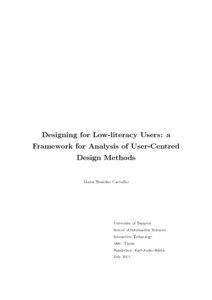Designing for Low-literacy Users: a Framework for Analysis of User-Centred Design Methods
BRANDAO CARVALHO, MAIRA (2011)
BRANDAO CARVALHO, MAIRA
2011
Vuorovaikutteinen teknologia - Interactive Technology
Informaatiotieteiden yksikkö - School of Information Sciences
This publication is copyrighted. You may download, display and print it for Your own personal use. Commercial use is prohibited.
Hyväksymispäivämäärä
2011-07-29
Julkaisun pysyvä osoite on
https://urn.fi/urn:nbn:fi:uta-1-21718
https://urn.fi/urn:nbn:fi:uta-1-21718
Tiivistelmä
Technology has the potential to improve the lives of marginalised communities from poor regions of the world, especially those with low-literacy skills. For that to happen, users' needs and characteristics should not be considered only as requirements, but also be incorporated in the software development process itself. Although there is a significant amount of research on the theme, the subject is complex and the knowledge produced by the community lacks systematisation. This thesis is an attempt to make that complexity more manageable. A succinct but comprehensive framework for analysis of methods was created from an extensive literature review of recent research on the topic, to guide researchers in their choices of methods to apply when developing for low-literacy users from poor regions. To exemplify its use and application, the framework is used to evaluate methods that could support the development of applications when users are geographically separated from the research team.
Key words and terms: illiteracy, functional illiteracy, low-literacy skills, evaluation of methods, methodologies, distance design, user-centred design, humancomputer interaction
Key words and terms: illiteracy, functional illiteracy, low-literacy skills, evaluation of methods, methodologies, distance design, user-centred design, humancomputer interaction
